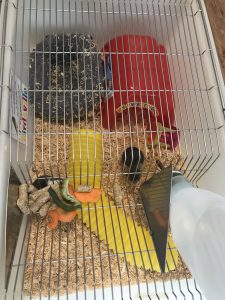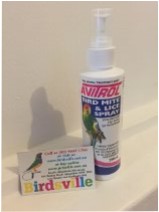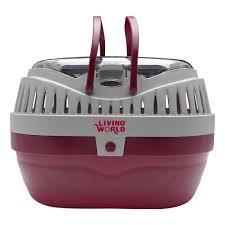This article about mice details below
- mice as pets and how many should you keep
- ideal mouse cages and set up ideas
- toys and enrichment with hides, hammocks, chew toys and tunnels
- Diet for pet mice and what not to feed.
- mineral supplements and vitamins
- set up check list
- best substrate for mice
- parasite control
- our mice for sale
Mice breeder Sydney
visit our Facebook and instar page for updated photos and what we currently have in stock https://www.facebook.com/BirdsvilleRosebery/ or follow our Instagram.

This article will go through everything you need to know about keeping mice as pets.
Their average lifespan is 1-3 years. Mice will enjoy having their face massaged and need to be handled frequently to maintain good behavior. They do not have good eyesight but have an excellent sense of smell and hearing. Mice are not always social, and it is ok to just have one mouse, depending on temperament of your mouse. Male mice can fight.
While many people will cringe at the thought of having pet mice, our thoughts are that they are extremely cute, and no one will ever be able to make us think otherwise.
Young mice can often be a bit jumpy by nature but with a little bit of handling it doesn’t take them long to tame up and bond to the owner.
Having two Mice is no more work than having only one and they can live in the same cage.
Our Mice for sale have not just been bred for color and temperament but have had different blood lines from around Australia to produce a stronger animal. Our Mice are not in bred. They will still have a short life span like all mice, but hopefully fingers crossed, breed out some of the common health conditions found in all domestic mice as the original breeding stock come from cancer research.
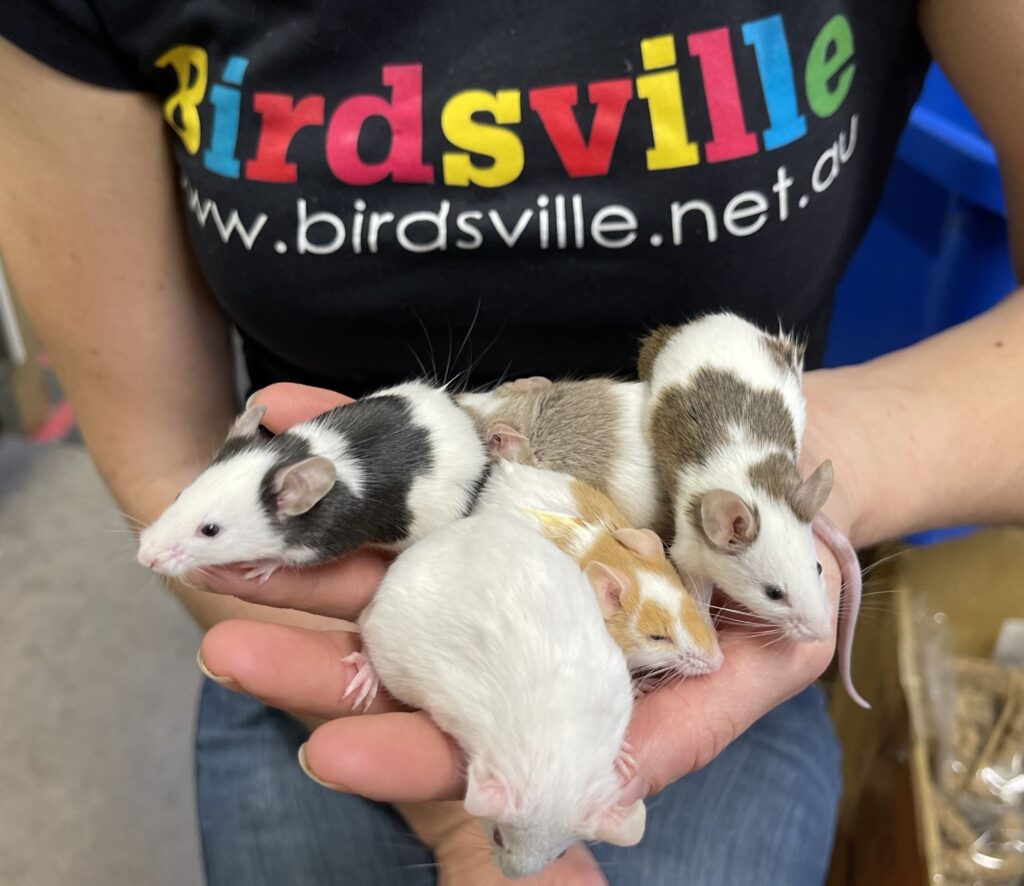
Mouse cages and enclosures for sale
Petsville, as a small animal specialist, has a huge range of mouse cages and enclosure to choose from on our mezzanine level.
Mouse enclosure size we recommend is around 34cm x 28cm x 34cm high. There is no such thing as an enclosure that’s too big.
The most popular mice enclosures have more than one level, as the mice love to climb, up and down.
When considering what enclosure to buy, you will need take into account the size of the wire as baby mics can escape through large, wired enclosure. They need enough space inside the enclosure for a mouse wheel, some hides, salt lick, mouse tunnels and so, to add some excitement into the enclosure.
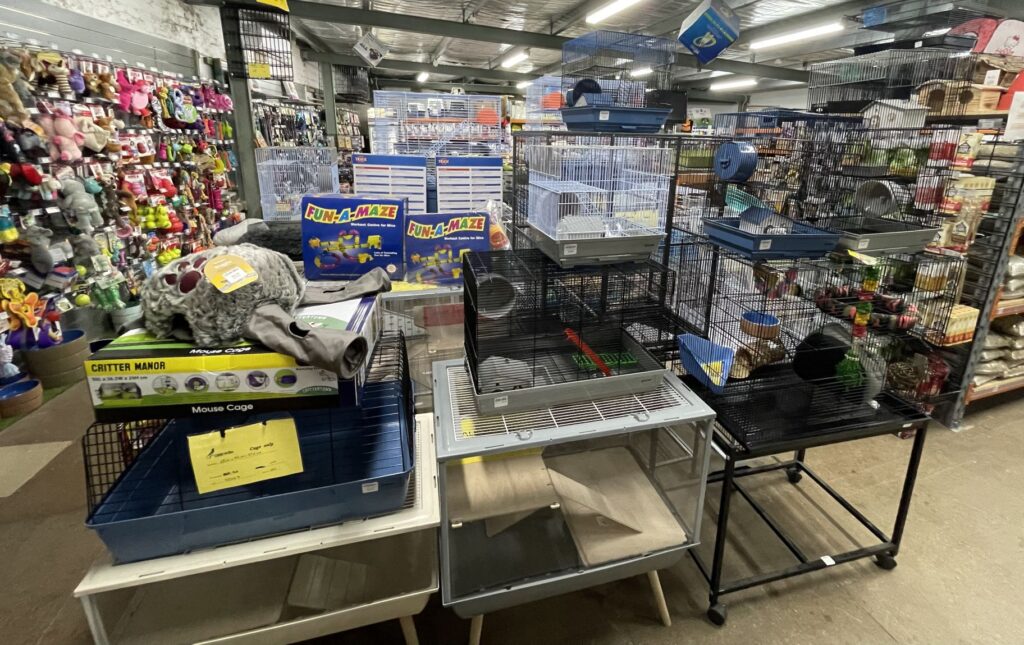
Mouse Enclosure set-up
When setting up your mouse enclosure, its best to deck the cage out thinking of levels.
On the top level – have some hanging toys
The middle level – a hide, maybe place some wooden bird perches, drink bottle, salt lick and a ladder.
The bottom level – some tunnels to run through, food bowls, chew toys and a mouse wheel.
Mice need a hide in the enclosure for them to feel safe as they like enclosed areas. Adding some nesting material is great to build a nest. Mice toys and chews are essential to keep the teeth warn down. Attach a saltlick to the side and a mouse wheel is great for exercise.
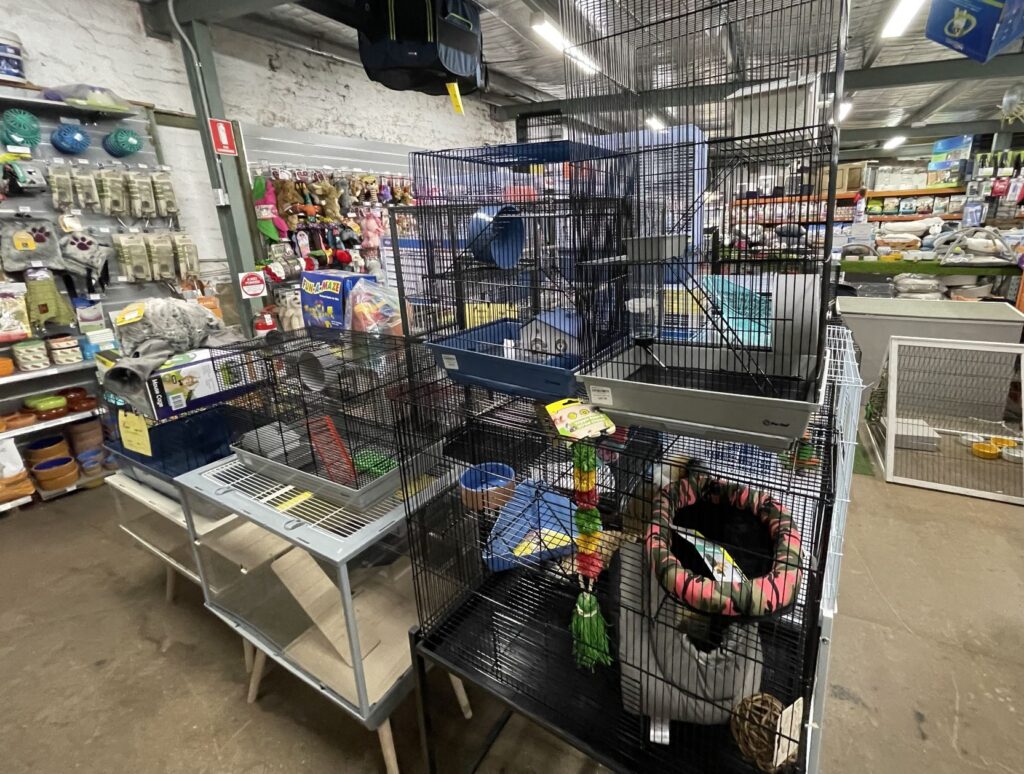
Substrate/bedding
Mice can be susceptible to respiratory conditions and that’s why we recommend hemp, Kaytee bedding, dust extracted wood shavings or breeders’ choice, which are dust free and very absorbent. Bedding depth can be around 5 to 15 CMS, the ticker the bedding the less often it needs to be changed. This is also dependent on the enclosure you choose as well.
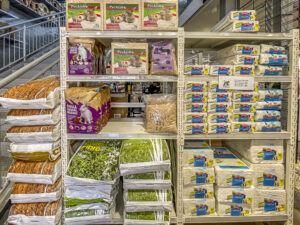
Toys for mice
Mice will need a large variety of toys to keep them stimulated and free of boredom. We have a huge area of mouse toys with hanging chew toys and ground toys. They particularly enjoy things to climb inside of i.e., tubes, tunnels, hides, mouse wheels, bird ladders boxes etc. they also enjoy balls and soft toys to chew or pull apart. Be sure to always keep their toys cleaned and replace any broken ones. Check the bird and reptile area of Petsville as bolt perches, reptile hides, and ladders among other toys are excellent for mice. We have such a large part of our store designated to just small animal toys for a reason as they just want to have fun. Toys also help to keep their teeth trim, which is very important, without toys it’s a matter of time before the teeth over grow and result in very expensive vet bills or starvation.
What is a Mouse life span
Being a tiny animal, they only live about 2 years.
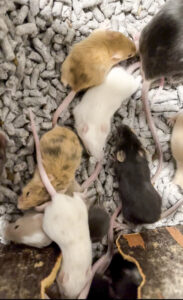
Diet for Mice
Mice are omnivorous, meaning they eat both plant and animal material.
What to Feed your Mice
Petsville Premium Rat and Mouse Blend, Vetafarm Rodent Origins, Selective Mouse, or Peckish Rat and Mouse is recommended to make up 90% of their diet.
These premier diets are quality feed and has been formulated by experts. A premier diet that contains a specific blend of vitamins, minerals and amino acids for long-term health and general vitality. Fruit flavored and extrusion cooked for increased palatability and digestibility.
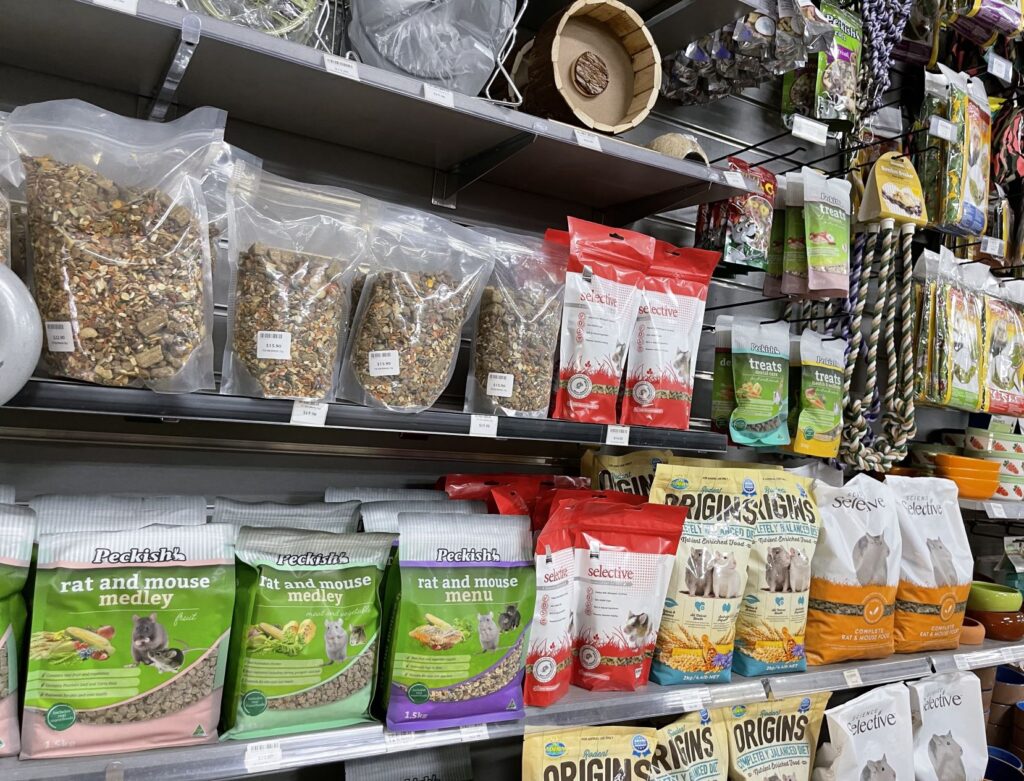
Some supermarket commercial foods are unhealthy and are often not the best option for a mouse. They may contain harmful additives, waste foods and chemical preservatives. Some contain whole corn kernels which could have fungus and mold present. There may also be tiny seeds and alfalfa pellets, which are hard for rats to digest, and they usually don’t care for it any way.
How Much to Feed
Food consumption varies with the quality of the food offered, the age, health, breeding status, environmental, temperature, and the time of day. Mice tend to eat more at night, but daytime feeding is also common.
Additions and Extras you can feed your mouse
My pet mice also receive a variety of different foods.
Fresh fruits may include but are not limited to:
Strawberries, Kiwi fruit, Bananas, Pears, Apples, Oranges, Watermelon, Cantaloupe, Papaya, Raisins, Avocado, Tomatoes, Nectarines, Peaches, Plums, Honeydew melon, Mango, Blueberries
Fresh vegetables include but are not limited to: Squash, Mustard greens, Collard greens, Romaine, Lettuce, Spinach, Cucumber, Alfalfa sprouts, Zucchini, Pumpkin, Asparagus, Broccoli, Cauliflower, Brussel sprouts, Carrots, Celery, Fennel and Sweet potato raw
Occasional treats include: Rice cakes, Cheese, Baby food with mixed baby cereal, Chicken bones, Dog biscuits, Soya milk, Fish sticks, Cooked rice and pasta
Whole protein sources: Chicken, Beef, Tuna, Salmon, Oysters, Shrimp and Liver
How to Feed your Mice
Their dry food can be placed in a food dispenser or put in a heavy ceramic dish that won’t tip over. This prevents little opportunity for fecal (stool) and urine contamination of food.
What not to feed your mice.
Too much cheese and blue cheese dressing is toxic, too much peanut butter, iceberg lettuce, licorice, rhubarb, red cabbage, artichoke, raw banana, potato skins, green or starchy potatoes, junk food in general, poppy seeds, lollys or chockolate.
To add that extra bit of health and vitality, Petsville stock small animal vitamin supplements drop that contain concentrated multivitamin, vitamin c and iron source. These supplements keep up their vitamin and mineral levels to keep your mouse happy and healthy.
Providing Water to your Mice
Having fresh water is very important, as many pet rodents presented as “sick” could actually be de-hydrated.
Fresh water should made constantly available and kept free from contamination.
Water is best provided in bottle drinkers, available in store at Birdsville. The tubes can become clogged with food debris, so they must be checked, if the water level hasn’t changed recently.
Mineral supplements for mice
Salt licks, mineral licks are important for mouse health and wellbeing. Your mice will need this depending on the diet. The fact of knowing you’re your rat needs salt will be unknown as some quality produce and good diets simply lack a high enough salt content, depending on where the produce is grown. Salt and minerals are necessary for a mouse diet, but it must be consumed in moderation which luckily your mice will instinctively know when its body needs additional salt. A salt lick is important as it will aid in digestion, muscles, nerves and fluid regulation.
Worming and Mite Spray for mice
Mice are very susceptible to worms as they naturally explore new objects with their mouths, they should be wormed within the first two weeks of being taken home, and every 3 months thereafter. These same worms can spread to humans. Spraying your mouse with mite and lice spray every six weeks is very important as mites and lice are very easily transmitted, even if you do not have other pets. It is possible (although uncommon) for your rat to contract fleas, if this does occur the safest method is to use a flea shampoo or powder and do a complete wash of their cage and bedding.
Mite and mange spray for mice
Mice are very susceptible to mites & mange. Spraying your animal with lice & mange spray every 12 weeks as a preventative will ensure you don’t have a problem. They can be easily transmitted by the common house fly and insects. Lice and mite spray is simply sprayed evenly on the animal avoiding the eyes, the bottle has easy to use instructions on the label.
Mouse Full Setup – Everything you will need:
Carry Cage– Every Mouse owner needs one for safe animal transport.
Enclosure/cage – We have a huge selection of mouse cages.
Quality Rat Pellets Mix– Petsville premium mouse food, Selective, peckish and Rodent Origins
Salt Lick / Mineral Block – – Provides essential salts and minerals including calcium to assist with healthy teeth, digestion, and healthy bones.
Treats – Great for training and rewarding and training your Mouse.
Drink bottles – Important as these can’t poo in it or be tipped over during the day.
Bowls – a place to put the mouses all you can eat buffet into.
Toys –, Hanging toys, chew toys and tunnels also bird toys are great for mice like ladders and perches. Minimum 4 appropriate toys for chewing and playing.
Hide – Small safe place for your rat to hide. Can range from tents, pouches, hanging hides and hides which come in a variety of materials and sizes. When choosing one, keep in mind how big your rat will grow too.
Substrate – Paper litter, mini help, oz hemp wood litter, dust extracted wood chips, dust extracted shavings or Kaytee litter.
Cage Cleaner – CSI, Vetafarm, F10 and Aristopet are all rat safe, nontoxic disinfectant and makes it easier to remove poo and dirt from hutch, toys, and bowl. Normal disinfects can be quite toxic to rabbits.
Wormer – Recommended to worm 1 week after bringing home and repeated every 3 months to prevent internal parasites.
Mite & Mange Spray – Recommended to use 1 weeks after bringing your mouse home and repeated every 3 months to prevent external parasites.
Extras that you may like to consider.
Feeding / Accessories – Spare treats and bowls for food and water
Vitamins – Small Animal Vitamins
Mouse shampoo – is available for the upper-class we stock small animal shampoo.
Bed – For the luxurious mice who likes comfort.
Tunnels – great for mice to run through and play.
Synbiotic / Probiotic – Can boost immune system, support digestive function when use daily. Also, can help Respiratory Rat disease.
First aid – Spark, Triple C, F10 barrier ointment and heat lights are a few things that can be kept on hand in case of an emergency.
Mouse wheel – A favorite of mice, they use them and love the exercise.
Health issues or changes in your Mouse:
If you ever notice a change in:
- behavior/appearance: off their food, quiet, lethargic, wheezing, runny nose, runny eyes, drooling, skinny.
- Cancer/tumors: Is quite common in rats partly because they originate from stock that were used for cancer research. They are often fatal without a vet intervention.
- Coat dandruff or fur loss: a sign your Rat has mites or less commonly fleas. A regular mite and lice treatment and a multivitamin should get their coat looking beautiful again.
- Weight loss: Could be caused by the above overgrown teeth or a whole host of reasons including cancer, neurological disease, virus, bacteria, starvation, trauma, stomach ulcers, injury, kidney failure, tumors, dental disease, poisoning, respiratory rat disease to name a few.
- Sudden Death Syndrome – Small animals are more susceptible to sudden death syndrome. There are many reasons why this can happen including but not limited to fright, being spooked, heart attack, stroke, nightmare or nightfright. Often when an animal that has passed of sudden death a full necropsy report from a vet will come back showing no reason as to why the animal has passed. Sudden death can occur with any animal especially small ones. Unfortunately, one cannot guarantee life of any creature tomorrow as it is a living being and not a toaster. By following this full page, you have the best chance possible in keeping your pet happy and healthy.
Visual Health checks
A visual health check is a great skill set for any Mouse owner to have and can increase your ability in spotting if your Mouse is not 100 %.
A mouse visual health check starts with a pat from the head to tail. If you feel tiny ribs and bones, then the Mouse is skinny and that is a big red flag. Continue by checking your mouse eyes, nose and mouth, there should be no discharge or mucus coming out of any of them. Move on to the eyes, they should be clear.
We do stock some basic medications, but we are not vets. Our team have been dealing with mice for a long time and are skilled in doing visual health checks. We also have a list of vets with links at the bottom of this page, as they can do a whole series of tests to pick up something for a mouse that is asymptomatic.
Handing your mouse
You will need to handle your mouse regularly, but remember it is only a baby. They also will need plenty of time to eat and rest. Handling your mouse gently and regularly will ensure it bonds to you quickly. While handling your mice giving it a treat and a cuddle will ensure it really enjoys your company.
Teeth Health
Mice’ teeth grow constantly throughout their lives, and if they are not fed an appropriate diet and given things to chew on, the teeth will over grow. Their teeth will begin to dig into the sides of their face and make them unable to chew normally. Without the proper attention, overgrown teeth can cause serious trauma, anorexia, infections, pain, and even death from the inability to chew and swallow. To avoid most these problems always have in the cage a form of wooden toy for them to chew on.
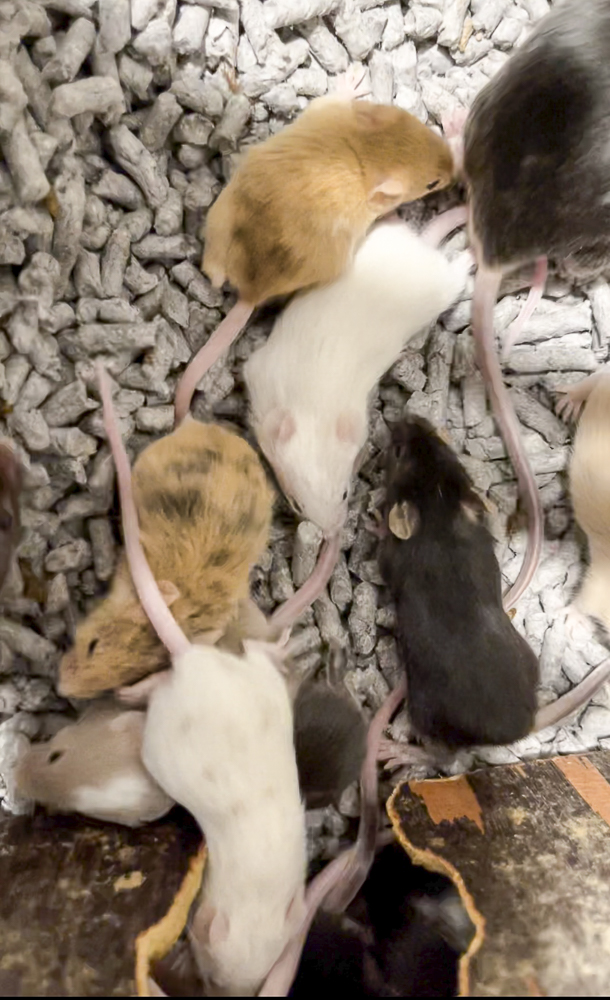
Hygiene
Mice live in such close contact with their litter and bedding, these must be kept clean and free from toxins. Cleaning your mice’s cage regularly, with the right cage cleaner, is essential to avoiding unnecessary health problems. Ammonia in the fumes of urine causes irritation in the nasal passage, which makes them more susceptible to infection. If your cage gets stinky you have left it too long.
Sexing your mouse
Please be aware these animals are not DNA sexed. Whilst we may give an opinion on sex and we are quite accurate, this is not a guarantee, as young mice can be hard to sex. We will always try to the best of our human ability.
Do not hesitate to come and see us in store if you have any concerns, or question and bring your mouse for us to see. It does not matter if the mouse came from somewhere else, we are happy to help.
Boarding your Mouse
Boarding is available throughout the year, please go to petsvillehotel.com for all bookings.
Recommended Vets and Links
SASH
Small Animal Specialist
Hospital 02 (9190 6806)
Level 1 1 richardson place North Ryde
The Wild Vet
1300 9453 838
22A Bridge Road, Glebe
SERV
02 9436 4884
57-63 Herbert St Artarmon
Southern Cross
02 9516 0234
60 Princes Hwy, St Peters
Carlingford Animal Hospital
02 9871 6036
772 Pennant Hills Road Carlingford
995 Bourke Street waterloo Sydney NSW 2017
Vetafarm Manufacture some of the food we supply and can answer any food questions regarding vetafarm products.
